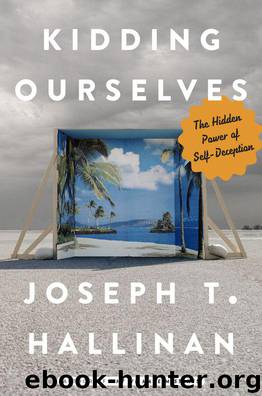Kidding Ourselves: The Hidden Power of Self-Deception by Joseph T. Hallinan

Author:Joseph T. Hallinan [Hallinan, Joseph T.]
Language: eng
Format: mobi
ISBN: 9780385348690
Publisher: Crown Publishing Group
Published: 2014-05-19T14:00:00+00:00
Superstition Breeds Confidence
AND that, in a nutshell, is the chief value of superstition—it helps us hold on. Whenever we find ourselves buffeted by doubt and uncertainty, a belief in the supernatural can spell the difference between failure and success by providing the confidence that allows us to carry on. This is a supremely valuable trait, and one that growing numbers of academics have come to regard as not only a healthy response to an uncertain world, but one that confers an evolutionary advantage. As two well-known scholars recently claimed, “behaviors which are, or appear, superstitious are an inevitable feature of adaptive behavior in all organisms, including ourselves.”
So why would superstition be good for us? In a word, it works. Not always and not for everything: it won’t make you tall if you are short, and it won’t stop speeding bullets or runaway trains. But when what we seek to accomplish lies within the realm of our abilities—when it is, in other words, doable—superstitious beliefs can tip the scales in our favor.
Consider a series of experiments conducted by German researchers at the University of Cologne. In 2010, they asked a number of men and women to do for science what millions of us do for fun: putt a golf ball. They divided these amateur golfers into two groups. Members of one group were handed a golf ball and told, “Here is your ball. So far it has turned out to be a lucky ball.” Members of the other group were also given a golf ball, but they received no such encouragement. They were simply told, “This is the ball everyone has used so far.” Then both groups were turned loose on a putting green.
What happened?
The golfers who used the “lucky” ball were much more accurate in their putting than were the ones who used the “regular” ball. In all, those with the “lucky” ball were 35 percent more likely to make a putt than the other golfers were. Moreover, these results weren’t confined to physical tasks, like putting a golf ball. When participants were asked to play a memory game, those who had their “lucky charms” with them performed significantly better than those who did not. As one of the study’s authors put it, “Our results suggest that the activation of a superstition can indeed yield performance-improving effects.”
So superstition can improve performance. But how? Research suggests that superstition works by creating a delusion that breeds an indispensable quality: confidence. In almost any human endeavor, confidence is essential; it is the plank across the river we otherwise can’t cross. And confidence works—not in some vague, intangible way, but in real, measurable ways that actually improve our performance. The important thing to understand, though, is that it doesn’t matter whether our confidence is boosted by information that is true or by information that we merely believe to be true—it works just the same.
This was recently demonstrated by psychologists Ulrich Weger and Stephen Loughnan. They asked two groups of people to play a game of Twenty Questions.
Download
This site does not store any files on its server. We only index and link to content provided by other sites. Please contact the content providers to delete copyright contents if any and email us, we'll remove relevant links or contents immediately.
| Administration & Medicine Economics | Allied Health Professions |
| Basic Sciences | Dentistry |
| History | Medical Informatics |
| Medicine | Nursing |
| Pharmacology | Psychology |
| Research | Veterinary Medicine |
The Art of Thinking Clearly by Rolf Dobelli(10383)
The 5 Love Languages: The Secret to Love That Lasts by Gary Chapman(9761)
Mindhunter: Inside the FBI's Elite Serial Crime Unit by John E. Douglas & Mark Olshaker(9299)
Becoming Supernatural by Dr. Joe Dispenza(8186)
Nudge - Improving Decisions about Health, Wealth, and Happiness by Thaler Sunstein(7678)
The Road Less Traveled by M. Scott Peck(7574)
Mastermind: How to Think Like Sherlock Holmes by Maria Konnikova(7304)
Enlightenment Now: The Case for Reason, Science, Humanism, and Progress by Steven Pinker(7288)
Win Bigly by Scott Adams(7172)
The Way of Zen by Alan W. Watts(6578)
Factfulness: Ten Reasons We're Wrong About the World – and Why Things Are Better Than You Think by Hans Rosling(4724)
The State of Affairs by Esther Perel(4705)
Gerald's Game by Stephen King(4625)
Man's Search for Meaning by Viktor Frankl(4556)
The Confidence Code by Katty Kay(4237)
Thinking in Bets by Annie Duke(4204)
The Healing Self by Deepak Chopra(3558)
Hidden Persuasion: 33 psychological influence techniques in advertising by Marc Andrews & Matthijs van Leeuwen & Rick van Baaren(3536)
The Worm at the Core by Sheldon Solomon(3468)
